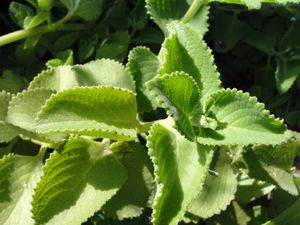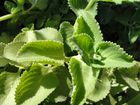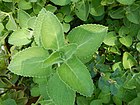Note: This is a project under development. The articles on this wiki are just being initiated and broadly incomplete. You can Help creating new pages.
Difference between revisions of "Plectranthus amboinicus - Karpuravalli, Doddapatre"
(→Parts Used) |
|||
| (15 intermediate revisions by 2 users not shown) | |||
| Line 1: | Line 1: | ||
[[File:A closeup of Indian Borage.JPG|thumb|right|''Karpuravalli'', '' dodda pathre'']] | [[File:A closeup of Indian Borage.JPG|thumb|right|''Karpuravalli'', '' dodda pathre'']] | ||
| − | |||
'''Plectranthus amboinicus''' once identified as Coleus amboinicus is a tender fleshy perennial plant in the family Lamiaceae with an oregano-like flavor and odor and native to Southern and Eastern Africa. | '''Plectranthus amboinicus''' once identified as Coleus amboinicus is a tender fleshy perennial plant in the family Lamiaceae with an oregano-like flavor and odor and native to Southern and Eastern Africa. | ||
| − | |||
==Uses== | ==Uses== | ||
| − | {{Uses|Respiratory | + | {{Uses|Respiratory problem}}, {{Uses|Cancer}}, {{Uses|Stress}}, {{Uses|Anxiety}}, {{Uses|Skin eruptions}}, {{Uses|Kidney problems}}, {{Uses|Fever}}, {{Uses|Irritable bowel syndrome}}, {{Uses|Sore throats}} |
==Parts Used== | ==Parts Used== | ||
| Line 13: | Line 11: | ||
==Common names== | ==Common names== | ||
| − | {{Common names|kn= | + | {{Common names|kn=Dodda pathre soppu, Karpoora valli|ml=Panikkurkka|sa=Karpuravalli|ta=Karpuravalli|te=Sugandhavalkam|hi=Patta ajwain|en=Cuban Oregano, Indian borage}} |
==Properties== | ==Properties== | ||
| Line 47: | Line 45: | ||
==List of Ayurvedic medicine in which the herb is used== | ==List of Ayurvedic medicine in which the herb is used== | ||
| − | * [[ | + | * [[Grahanimihira Taila]] |
==Where to get the saplings== | ==Where to get the saplings== | ||
| Line 57: | Line 55: | ||
==Commonly seen growing in areas== | ==Commonly seen growing in areas== | ||
| − | {{Commonly seen|Tall grasslands}}, {{Commonly seen|meadows}}, {{Commonly seen|Borders of forests and fields}}. | + | {{Commonly seen|Tall grasslands}}, {{Commonly seen|At meadows}}, {{Commonly seen|Borders of forests and fields}}. |
==Photo Gallery== | ==Photo Gallery== | ||
<gallery class="left" caption="" widths="140px" heights="140px"> | <gallery class="left" caption="" widths="140px" heights="140px"> | ||
| − | + | A closeup of Indian Borage (Oregano).JPG | |
| − | File: | + | A closeup of Indian Borage.JPG |
| − | + | CarranglanCentralSchooljf4357 10.JPG | |
| + | File:Starr 071024-0026 Plectranthus amboinicus.jpg | ||
| + | File:Starr 071024-0027 Plectranthus amboinicus.jpg|Flowers | ||
</gallery> | </gallery> | ||
==References== | ==References== | ||
| − | |||
<references> | <references> | ||
| − | <ref name="chemical composition">[https://www.ncbi.nlm.nih.gov/pubmed/24491635 | + | <ref name="chemical composition">[https://www.ncbi.nlm.nih.gov/pubmed/24491635 Chemical constituents]</ref> |
| − | <ref name="Leaf">[http://www.learn2grow.com/plants/plectranthus-amboinicus-variegatus/ | + | <ref name="Leaf">[http://www.learn2grow.com/plants/plectranthus-amboinicus-variegatus/ Ornamental Features]</ref> |
| − | <ref name="How to plant/cultivate">[http://tropical.theferns.info/viewtropical.php?id=Plectranthus%20amboinicus | + | <ref name="How to plant/cultivate">[http://tropical.theferns.info/viewtropical.php?id=Plectranthus%20amboinicus Cultivation Details]</ref> |
</references> | </references> | ||
| Line 82: | Line 81: | ||
[[Category:Herbs]] | [[Category:Herbs]] | ||
| + | [[Category:Lamiaceae]] | ||
| + | [[Category:Pages without herbs images]] | ||
Latest revision as of 12:00, 14 March 2020
Plectranthus amboinicus once identified as Coleus amboinicus is a tender fleshy perennial plant in the family Lamiaceae with an oregano-like flavor and odor and native to Southern and Eastern Africa.
Contents
- 1 Uses
- 2 Parts Used
- 3 Chemical Composition
- 4 Common names
- 5 Properties
- 6 Habit
- 7 Identification
- 8 List of Ayurvedic medicine in which the herb is used
- 9 Where to get the saplings
- 10 Mode of Propagation
- 11 How to plant/cultivate
- 12 Commonly seen growing in areas
- 13 Photo Gallery
- 14 References
- 15 External Links
Uses
Respiratory problem, Cancer, Stress, Anxiety, Skin eruptions, Kidney problems, Fever, Irritable bowel syndrome, Sore throats
Parts Used
Chemical Composition
Hymoquinone (5) was further identified as a nonpolar ingredient from the hexane extract of P. amboinicus to suppress the expression of lipopolysaccharide-induced tumor necrosis factor-alpha (TNF-α). We then synthesized 2-alkylidenyl-4-cyclopentene-1,3-diones as the designed biomimetics of thymoquinone, and found that compounds 8a, 8b and 8d were more potent TNF-α inhibitors[1]
Common names
| Language | Common name |
|---|---|
| Kannada | Dodda pathre soppu, Karpoora valli |
| Hindi | Patta ajwain |
| Malayalam | Panikkurkka |
| Tamil | Karpuravalli |
| Telugu | Sugandhavalkam |
| Marathi | NA |
| Gujarathi | NA |
| Punjabi | NA |
| Kashmiri | NA |
| Sanskrit | Karpuravalli |
| English | Cuban Oregano, Indian borage |
Properties
Reference: Dravya - Substance, Rasa - Taste, Guna - Qualities, Veerya - Potency, Vipaka - Post-digesion effect, Karma - Pharmacological activity, Prabhava - Therepeutics.
Dravya
Rasa
Tikta (Bitter), Katu (Pungent)
Guna
Laghu (Light), Ruksha (Dry), Tikshna (Sharp)
Veerya
Ushna (Hot)
Vipaka
Katu (Pungent)
Karma
Kapha, Vata
Prabhava
Habit
Identification
Leaf
| Kind | Shape | Feature |
|---|---|---|
| Simple | Evergreen | Foliage Color is White, Light Green, Gray Green |
Flower
| Type | Size | Color and composition | Stamen | More information |
|---|---|---|---|---|
| Unisexual | 2-4cm long | White, Pink, Lavender | Single | Flower Interest is Showy |
Fruit
| Type | Size | Mass | Appearance | Seeds | More information |
|---|---|---|---|---|---|
| General | 7–10 mm | Fragrant Fruit is present | Fruit Color is Sandy Brown | {{{6}}} |
Other features
List of Ayurvedic medicine in which the herb is used
Where to get the saplings
Mode of Propagation
How to plant/cultivate
Plectranthus amboinicus is a plant that ranges from warm temperate areas with dry, mild winters to tropical areas with dry to wet climates[3]
Commonly seen growing in areas
Tall grasslands, At meadows, Borders of forests and fields.
Photo Gallery
References
External Links
- Ayurvedic Herbs known to be helpful to treat Respiratory problem
- Ayurvedic Herbs known to be helpful to treat Cancer
- Ayurvedic Herbs known to be helpful to treat Stress
- Ayurvedic Herbs known to be helpful to treat Anxiety
- Ayurvedic Herbs known to be helpful to treat Skin eruptions
- Ayurvedic Herbs known to be helpful to treat Kidney problems
- Ayurvedic Herbs known to be helpful to treat Fever
- Ayurvedic Herbs known to be helpful to treat Irritable bowel syndrome
- Ayurvedic Herbs known to be helpful to treat Sore throats
- Herbs with Leaves used in medicine
- Herbs with common name in Kannada
- Herbs with common name in Hindi
- Herbs with common name in Malayalam
- Herbs with common name in Tamil
- Herbs with common name in Telugu
- Herbs with common name in Sanskrit
- Herbs with common name in English
- Habit - Perennial plant
- Index of Plants which can be propagated by Seeds
- Index of Plants which can be propagated by Cuttings
- Herbs that are commonly seen in the region of Tall grasslands
- Herbs that are commonly seen in the region of At meadows
- Herbs that are commonly seen in the region of Borders of forests and fields
- Herbs
- Lamiaceae
- Pages without herbs images





